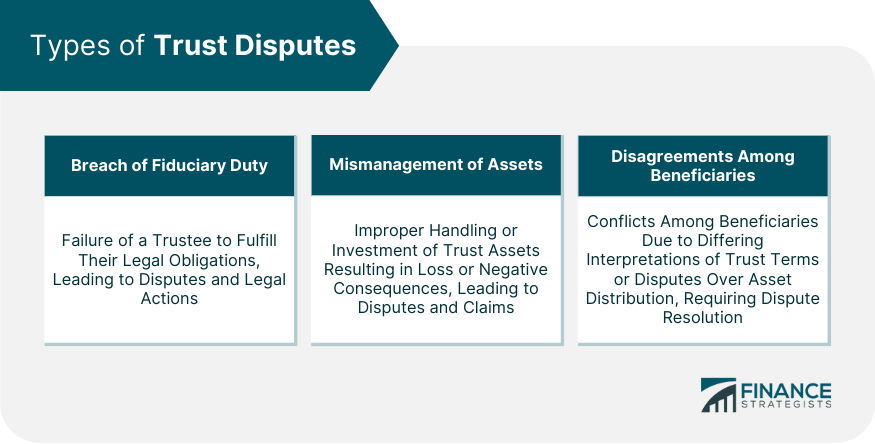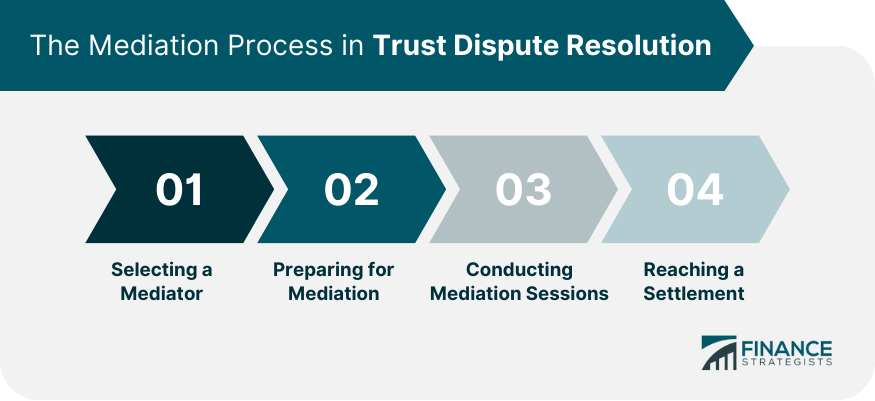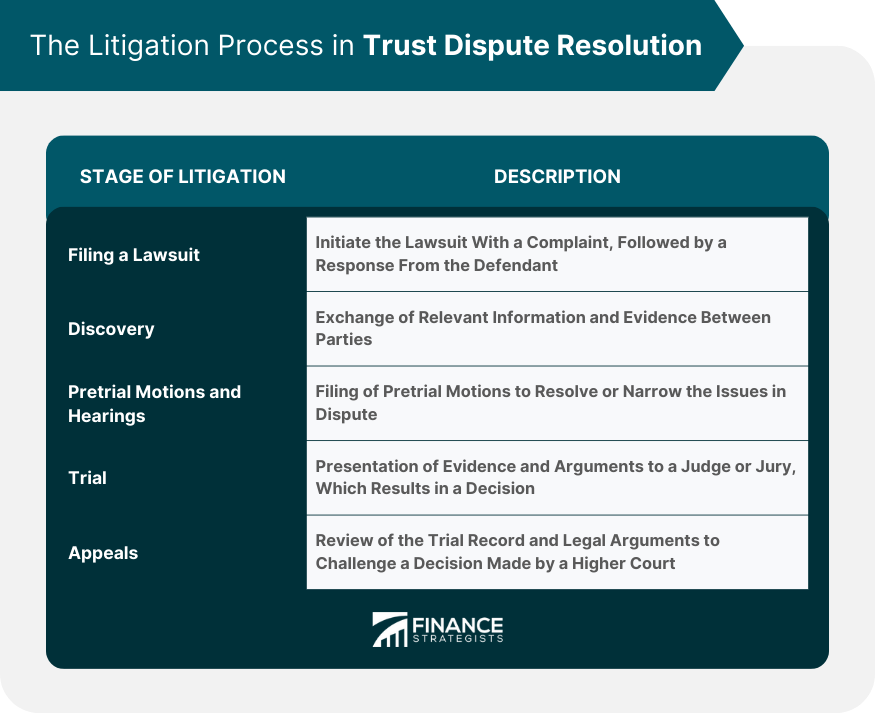Trust dispute resolution is the process of resolving conflicts and disagreements related to trusts and the administration of trust assets. These disputes can arise between trustees, beneficiaries, and other interested parties, and often involve complex legal and financial issues. Trust plays a crucial role in personal and professional relationships, as it serves as the foundation for collaboration, cooperation, and mutual understanding. Disputes involving trusts can undermine these relationships and lead to significant emotional and financial consequences for all parties involved. Trust disputes can take many forms and often involve complex legal issues. Common types of trust disputes include breach of fiduciary duty, mismanagement of assets, and disagreements among beneficiaries. Understanding the different types of trust disputes is essential for effective resolution. A breach of fiduciary duty occurs when a trustee fails to fulfill their legal obligations to the trust and its beneficiaries. This can involve actions such as self-dealing, negligence, or failing to act in the best interests of the trust and its beneficiaries, leading to disputes and potential legal actions. Mismanagement of trust assets refers to instances where a trustee improperly handles or invests the assets held in trust, resulting in a loss of value or other negative consequences for the trust and its beneficiaries. This can lead to disputes and claims against the trustee for their actions. Disagreements among beneficiaries can arise for various reasons, including differing interpretations of the trust terms or disputes over the distribution of trust assets. These conflicts can strain relationships between beneficiaries and require dispute resolution mechanisms to reach a resolution. Several factors can contribute to trust disputes, such as lack of communication, misinterpretation of trust terms, and unequal distribution of assets. Identifying and addressing the root causes of trust disputes can help to prevent conflicts and promote a more harmonious administration of trust assets. Poor communication between trustees, beneficiaries, and other interested parties can lead to misunderstandings and disputes. Open, honest, and regular communication can help to build trust and prevent conflicts from arising. Disputes can arise when parties involved in a trust have different interpretations of the trust terms and provisions. Clarifying the trust terms and ensuring that all parties understand their rights and obligations can help to prevent misinterpretations and disputes. Unequal distribution of trust assets can lead to disputes among beneficiaries, particularly if they perceive the distribution as unfair or inequitable. Ensuring that trust distributions are made according to the terms of the trust and in a fair and transparent manner can help to prevent disputes and maintain harmony among beneficiaries. Mediation is a voluntary, confidential, and non-adversarial process in which a neutral third party, known as a mediator, facilitates communication and negotiation between disputing parties to help them reach a mutually acceptable resolution. Mediation is a widely used method for resolving trust disputes. Mediation offers several benefits for trust dispute resolution, including confidentiality, flexibility, and cost-effectiveness. These advantages make mediation an attractive option for parties seeking to resolve their disputes in a more cooperative and less adversarial manner. Mediation is confidential, which means that the parties involved can discuss sensitive information without fear of it becoming public knowledge. This confidentiality encourages open and honest communication between the parties and can lead to a more effective and lasting resolution. Mediation offers flexibility in the dispute resolution process, allowing parties to tailor the process to their specific needs and circumstances. This can include scheduling, the format of mediation sessions, and the involvement of experts or advisors. The flexible nature of mediation can help to create a more collaborative and productive environment for resolving trust disputes. Mediation is generally more cost-effective than litigation, as it avoids the expenses associated with court fees, attorney fees, and other costs of a trial. By helping parties reach a mutually acceptable resolution more quickly, mediation can save time and resources, making it an attractive option for trust dispute resolution. Choosing the right mediator is crucial for a successful mediation process. Parties should select a mediator with experience in trust disputes, strong communication skills, and a proven track record of helping parties reach a resolution. A mediator's impartiality and neutrality are also essential factors to consider. Before the mediation process begins, parties should prepare by gathering relevant documents, clarifying their goals and interests, and developing an understanding of the other party's perspective. Being well-prepared can facilitate a more efficient and productive mediation process, increasing the chances of a successful resolution. During mediation sessions, the mediator guides the parties through a structured process, encouraging open communication, and helping the parties explore their interests and potential solutions. The mediator facilitates the negotiation process but does not make decisions or impose solutions on the parties. If the parties reach a mutually acceptable resolution during mediation, they will typically create a written settlement agreement outlining the terms of their agreement. This document, once signed, can be legally binding and enforceable, providing a resolution to the trust dispute. Litigation is the process of resolving disputes through the court system. In the context of trust disputes, litigation involves filing a lawsuit, presenting evidence and arguments, and ultimately obtaining a court decision on the matters at issue. Litigation offers several benefits for trust dispute resolution, including court enforcement, legal precedent, and the adjudication of complex disputes. These advantages make litigation a viable option for parties seeking a formal resolution to their trust disputes. One of the primary benefits of litigation is that the court's decision is legally binding and enforceable. This can provide certainty and finality to the parties, ensuring that the resolution of the trust dispute is upheld and enforced. Litigation can establish legal precedent, which can help to clarify the law and provide guidance for future disputes involving similar issues. This can be particularly beneficial in complex trust disputes or cases involving novel legal questions. Litigation may be the most appropriate method for resolving complex trust disputes, particularly when the parties cannot reach an agreement through mediation or other alternative dispute resolution methods. The court's ability to adjudicate complex legal and factual issues can provide a decisive resolution to the dispute. The litigation process begins with the filing of a lawsuit, which typically involves drafting and filing a complaint outlining the claims and relief sought. The defendant will then have an opportunity to respond to the allegations, either by filing an answer or a motion to dismiss. During the discovery phase, parties exchange information and evidence relevant to the dispute. This can include written interrogatories, document requests, and depositions. Discovery allows parties to gather the information necessary to build their case and prepare for trial. Before trial, parties may file various motions, such as motions for summary judgment or motions to exclude evidence, in an effort to resolve or narrow the issues in dispute. Pretrial hearings may be held to address these motions, as well as other procedural matters related to the case. If the case proceeds to trial, parties will present their evidence and arguments to a judge or jury. The trial process typically involves opening statements, direct and cross-examinations of witnesses, and closing arguments. At the conclusion of the trial, the judge or jury will render a decision on the matters at issue. If a party is dissatisfied with the outcome of the trial, they may appeal the decision to a higher court. The appeals process involves a review of the trial record and legal arguments to determine whether any legal errors were made that warrant a reversal or modification of the judgment. When deciding between mediation and litigation for trust dispute resolution, parties should consider factors such as the complexity of the dispute, cost, timeframe, and confidentiality. These factors can help guide the decision-making process and ensure that the chosen method aligns with the parties' goals and circumstances. Complex trust disputes may benefit from the expertise and adjudication provided by the court system. However, for less complex disputes or situations where parties seek a more collaborative resolution, mediation may be a more suitable option. Mediation is generally more cost-effective than litigation, making it an attractive choice for parties seeking to minimize expenses. However, parties must weigh the potential savings against the benefits of a legally binding court decision, which may be more important in some cases. The timeframe for dispute resolution can vary significantly between mediation and litigation. Mediation typically offers a faster resolution, as it avoids the lengthy court process. However, if a binding court decision is a priority, the additional time required for litigation may be acceptable. Mediation provides a confidential forum for resolving trust disputes, whereas litigation typically involves public court proceedings. Parties who value privacy and confidentiality may prefer the mediation process for this reason. Parties should carefully consider the benefits and drawbacks of each dispute resolution method, taking into account their specific circumstances and priorities. By evaluating the options, parties can make an informed decision about the best approach for resolving their trust dispute. After considering the factors and weighing the advantages and disadvantages of each method, parties should make a final decision on the appropriate dispute resolution method. This decision should reflect the parties' goals, priorities, and the specific circumstances of the trust dispute. Trust dispute resolution is a crucial process for resolving conflicts and disagreements related to trusts and the administration of trust assets. Trust disputes can involve complex legal and financial issues and can arise between trustees, beneficiaries, and other interested parties. The types of trust disputes include breach of fiduciary duty, mismanagement of assets, and disagreements among beneficiaries, and the causes can be lack of communication, misinterpretation of trust terms, and unequal distribution of assets. Mediation and litigation are the two primary methods for resolving trust disputes. Mediation is a voluntary, confidential, and non-adversarial process that offers several benefits, including confidentiality, flexibility, and cost-effectiveness. On the other hand, litigation involves resolving disputes through the court system and offers benefits such as court enforcement, legal precedent, and the adjudication of complex disputes. When deciding between mediation and litigation, parties should consider factors such as the complexity of the dispute, cost, timeframe, and confidentiality to make an informed decision on the appropriate dispute resolution method. Overall, understanding the types, causes, and resolution methods for trust disputes can help prevent conflicts and promote a more harmonious administration of trust assets. If you are involved in a trust dispute or are concerned about the possibility of one, it's essential to seek the guidance of an experienced estate planning lawyer. An estate planning lawyer can help you navigate the complex legal and financial issues related to trusts and ensure that your rights and interests are protected throughout the dispute resolution process.What Is Trust Dispute Resolution?
Understanding Trust Disputes
Types of Trust Disputes
Breach of Fiduciary Duty
Mismanagement of Assets
Disagreements Among Beneficiaries

Causes of Trust Disputes
Lack of Communication
Misinterpretation of the Trust Terms
Unequal Distribution of Assets
The Role of Mediation in Trust Dispute Resolution
Benefits of Mediation
Confidentiality
Flexibility
Cost-Effectiveness
The Mediation Process

Selecting a Mediator
Preparing for Mediation
Conducting Mediation Sessions
Reaching a Settlement
The Role of Litigation in Trust Dispute Resolution
Benefits of Litigation
Court Enforcement
Legal Precedent
Adjudication of Complex Disputes
The Litigation Process
Filing a Lawsuit
Discovery
Pretrial Motions and Hearings
Trial
Appeals

Choosing the Right Dispute Resolution Method
Factors to Consider
Complexity of the Dispute
Cost
Timeframe
Confidentiality
Evaluation of the Mediation and Litigation Options
Final Decision on the Dispute Resolution Method
Final Thoughts
Trust Dispute Resolution FAQs
Trust dispute resolution refers to the process of resolving conflicts and disagreements that arise among trustees, beneficiaries, or other parties involved in a trust. It can involve methods such as mediation or litigation to address issues like breaches of fiduciary duty, mismanagement of assets, or disagreements among beneficiaries.
Mediation is a confidential, flexible, and cost-effective method for resolving trust disputes. An impartial mediator helps the parties communicate, explore their interests, and negotiate potential solutions. If an agreement is reached, a legally binding settlement document is drafted and signed by the parties.
Litigation may be necessary when parties cannot reach an agreement through mediation or other alternative dispute resolution methods. It may also be more suitable for complex trust disputes or cases involving novel legal questions, as the court can adjudicate these issues and provide a legally binding decision.
When choosing between mediation and litigation, consider factors such as the complexity of the dispute, cost, timeframe, and confidentiality. Evaluate the benefits and drawbacks of each method in light of your specific circumstances and priorities, and seek professional guidance from an estate planning lawyer if needed.
Preventing trust disputes involves clear communication, careful drafting of trust documents, and regular reviews of the trust's administration. In case a dispute arises, seek the assistance of an experienced estate planning lawyer who can provide expert guidance on trust dispute resolution methods tailored to your unique situation.
True Tamplin is a published author, public speaker, CEO of UpDigital, and founder of Finance Strategists.
True is a Certified Educator in Personal Finance (CEPF®), author of The Handy Financial Ratios Guide, a member of the Society for Advancing Business Editing and Writing, contributes to his financial education site, Finance Strategists, and has spoken to various financial communities such as the CFA Institute, as well as university students like his Alma mater, Biola University, where he received a bachelor of science in business and data analytics.
To learn more about True, visit his personal website or view his author profiles on Amazon, Nasdaq and Forbes.











